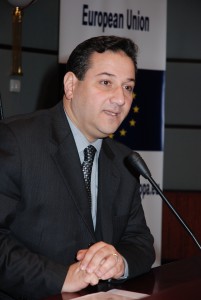Each week Emerging Markets ESG publishes an interview entitled, “Five Questions about SRI.” The interview features a practitioner’s insights about SRI in emerging markets and through Emerging Markets ESG shares this expertise with a wide global audience. The goals of Five Questions about SRI are fourfold:
- To reflect on what SRI in emerging markets means to practitioners;
- To collect a catalogue of examples of SRI in practice in emerging markets;
- To raise awareness about SRI in emerging markets; and
- To enable SRI practitioners in emerging markets to network with peers around the world.
This week’s interview is with Dr. Ashraf Gamal, Executive Director, the Egyptian Institute of Directors (EIoD) and the Egyptian Corporate Responsibility Center (ECRC).
The EIoD, working under the umbrella of the Ministry of Investment, aims to spread awareness, knowledge, and best practices of corporate governance in Egypt, the Middle East, and North Africa (MENA) region in a way that meets the legitimate expectations and best interests of various stakeholders, and in different types of organizations such as listed, non-listed, family-owned and state-owned enterprises (SOEs). The activities of the Institute are targeted at directors, key executives, shareholders, and other stakeholders of such organizations. Dr. Gamal holds a Ph.D. degree in Management from the University of Manchester, UK, and a Master’s degree in Public Administration from Carleton University, Canada.
Emerging Markets ESG: How would you define socially responsible investment (SRI)?
 Dr. Ashraf Gamal: SRI is the investment that takes into account the interests of investors plus the interest of the society at large. It is an example of a win-win situation in which investors achieve their ultimate goal of making profits without sacrificing the interests of the society to have clean environment and to use its resources efficiently.
Dr. Ashraf Gamal: SRI is the investment that takes into account the interests of investors plus the interest of the society at large. It is an example of a win-win situation in which investors achieve their ultimate goal of making profits without sacrificing the interests of the society to have clean environment and to use its resources efficiently.
Emerging Markets ESG: What distinguishes SRI from mainstream investment?
Dr. Ashraf Gamal: Main stream investment would focus on profits only. Therefore, in evaluating various production and packaging options, as well as all other business decisions, concepts such as job creation through using labor-intensive technologies, clean environment, market segmentation that includes traditionally marginalized groups such as the handicapped or illiterate, all such factors will not be considered unless mandated by law.
Emerging Markets ESG: Which extra-financial theme – environmental, social or governance – is the most challenging for Egyptian companies to manage?
Dr. Ashraf Gamal: I would say business-to-business and business-to-government corruption is a key area that is challenging to manage. This is simply because in some industries and sectors of the society, corruption is an acceptable way of getting things done. This in many cases does not include money bribery, but rather other types of behaviors that are not even perceived to be corrupt by large sections of the society itself.
Emerging Markets ESG: Which extra-financial theme – environmental, social or governance – is the most challenging for investors in Egypt to analyze?
Dr. Ashraf Gamal: I guess this could be the “conflict of interest”. This is because there is a considerable amount of “informal” relationships that may not be visible to a foreign investor and that may not be easy for him/her to understand. Another area is evaluating the independence of professional service providers such as auditors, accounting firms, HR service providers, etc. it will not be easy for a foreign investor to get all the needed information to help him/her make the right decision in such areas.
Emerging Markets ESG: What role do boards of directors play in promoting SRI in Egypt and attracting foreign SRI to Egypt?
Dr. Ashraf Gamal: The trend towards SRI is increasing, although still far away from where Egypt must be. The visible areas in which boards play important role include pollution control and product safety. Other areas are not so visible in board meetings such as human rights and corruption. From the Egyptian Institute of Directors’ experience, our boards still need a lot of training on identifying ways in which they can support SRI.